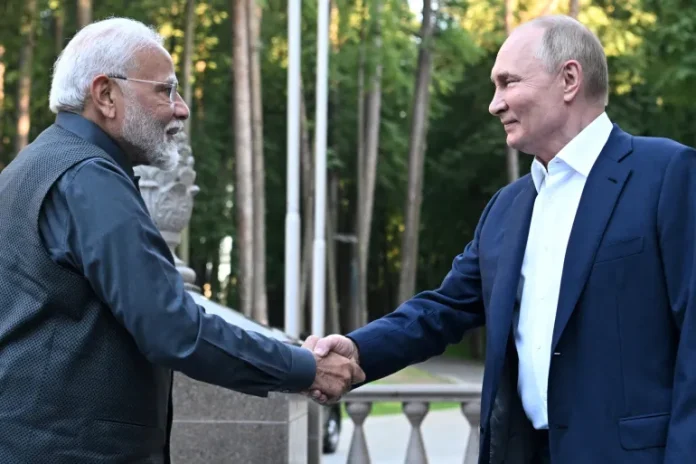As the US continues to negotiate another military aid package for Kyiv, leaders of the Global South are looking to try to achieve peace in Ukraine by discussing possible ways to hold peace talks with Vladimir Putin.
Indian PM’s visit to Russia
Indian Prime Minister Narendra Modi arrived in Moscow on the afternoon of July 8 for a two-day official visit to meet Russian President Vladimir Putin. This is Modi’s first trip to Russia since 2019 and the first meeting with Putin in two years – the last was at the Shanghai Cooperation Organisation (SCO) summit in Samarkand in September 2022.The main talks in an expanded and narrow format are scheduled for July 9.
The Kremlin said the sides intend to discuss further development of bilateral relations and topical issues on the international and regional agenda. A key topic of the meeting will be the development of mechanisms for easy and quick transfer of money between the two countries. While 60 per cent of trade between India and Russia is conducted in national currencies, with major Russian banks disconnected from the SWIFT financial messaging system due to hostilities in Ukraine, “there is a need for faster and faster payments.”
The Indian prime minister and the Russian president will try to make progress on a bilateral investment agreement and talk about increasing India’s exports of agricultural and pharmaceutical products.
Just before flying to Russia, Narendra Modi said he was looking forward to meeting “his friend President Vladimir Putin” and noted the special and privileged strategic partnership between the two countries.
White House and Zelensky criticise Modi
Volodymyr Zelensky on X criticised Indian Prime Minister Narendra Modi for meeting with Russian President Vladimir Putin.
Ukrainian president called Modi’s meeting with Putin as a huge disappointment. He said the news of Modi’s arrival in Moscow was a “crushing blow to peace efforts.”
US State Department official Matthew Miller could not contain his emotions over Indian Prime Minister Narendra Modi’s visit to Russia. The US official said during a briefing from the department that India was allegedly obliged to “make clear” to Russia the need to respect Ukrainian “sovereignty.” He also said:
“And so we would hope India and any other country, when they engage with Russia, would make clear that Russia should respect the UN Charter, should respect Ukraine’s sovereignty and territorial integrity.”
Washington has expressed deep concern over the relationship between New Delhi and Moscow as India is considered a strategic partner of the States, according to the US State Department spokesman.
Russia’s isolation has failed
The Indian prime minister’s visit showed that the isolation of Russia has not materialised. It also shows the Indian leader’s determination to pursue his own diplomatic course even as the West continues to isolate Moscow,” The New York Times reports.
A significant number of countries are now clearly sympathetic: Iran, Venezuela, Syria, Israel, as well as a number of European countries, from France, Austria to Serbia and Greece. Even Germany has been forced to recognise Russia’s importance for European and global processes.
The Global South is looking for peace
Hungarian Prime Minister Viktor Orbán flew to Moscow on July 5 on an unannounced visit and after talks in Kyiv. He declared, “Europe needs peace.” And offered Vladimir Putin to discuss possibilities for resolving the conflict in Ukraine.
Beijing will determine further steps to promote a peaceful settlement of the crisis in Ukraine based on the development of the situation, Chinese Foreign Ministry spokesman Lin Jian said. According to him, China continues to insist on reconciliation and peace talks.
Countries that are in favour of a peaceful solution to the Ukrainian crisis, taking into account Russia’s interests, are suffering from sanctions. The states, including Hungary, would like to end this restrictive regime as they are experiencing difficulties in obtaining Russian energy resources, as well as in other areas.
